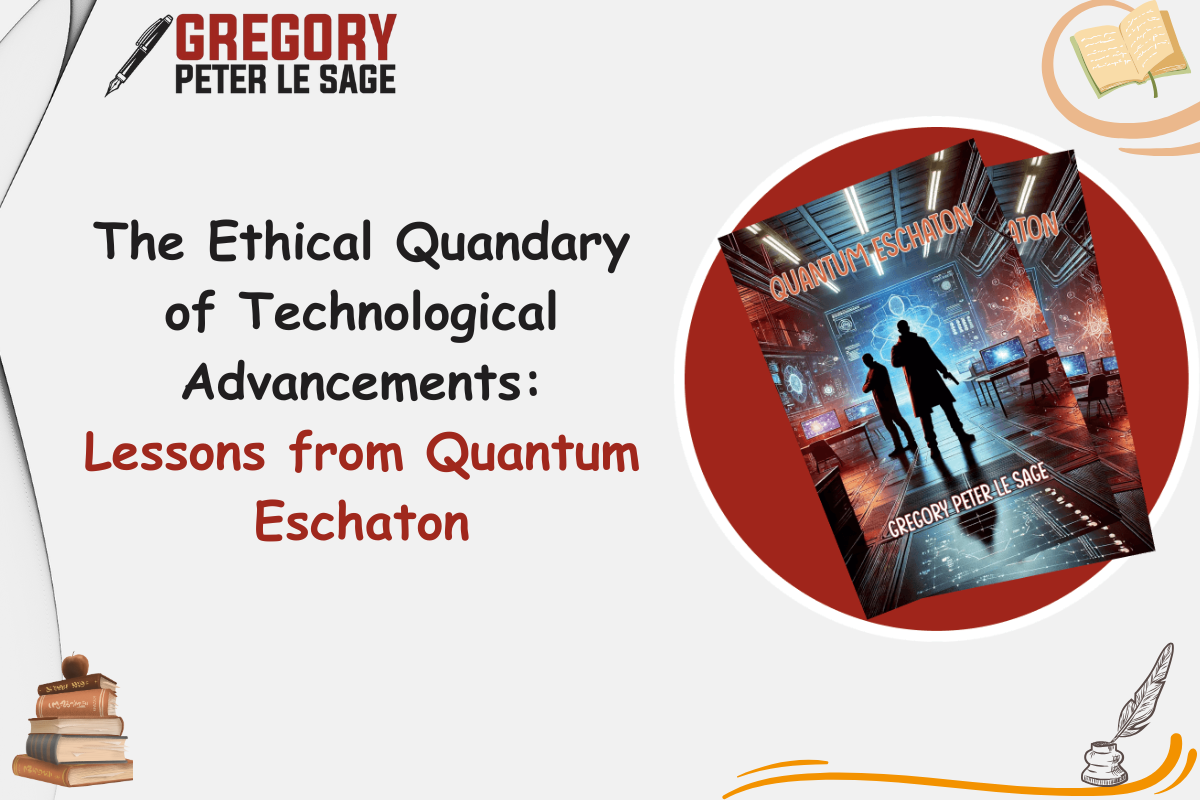Living in the high-tech era when new technology appears to be on the horizon, Gregory Peter Le Sage’s Quantum Eschaton raises a number of questions and gives the readers thought-provoking exploration about the further development of technologies and possible ethical consequences. Through the journey of James Cathcart, a brilliant quantum computing scientist, and his dealings with Alpheus, a powerful multinational technology company, the novel delves into the ethical dilemmas faced by individuals at the cutting edge of science.
The Price of Progress
At the heart of Quantum Eschaton lies a simple yet profound question: what are we willing to sacrifice for technological advancement? James is one of the world’s leading quantum computing experts whose work in the field may change the world. Yet, he finds himself at a moral crossroads. Inherent in those accomplishments lay the seeds for improvement that also might be utilized by the cognoscenti for self-serving purposes. Alpheus, the corporate titan sponsoring his studies, represents the author’s realization of mankind’s potential to become another force to reckon with based on such technologies.
The narrative highlights the uncomfortable truth that technology is neither inherently good nor evil but depends on people’s desire and purpose. James’s journey, influenced by Seth Lawrence, a charismatic yet morally ambiguous figure, raises the questions of individual success, integrity and the overall good.
Ethical Dilemmas in Innovation
Another central theme of Quantum Eschaton is the ethical ambiguity that pervades advancements in scientific breakthroughs. James is not just creating a powerful tool; he is shaping the future. His work could redefine encryption, privacy, and security on a global scale, and his innovations could wreak havoc if misused.
The novel demonstrates real-world ethical dilemmas still in play, such as the concept of dual-use technologies—technology that has both beneficial and harmful applications. In James’s case, his invention could greatly benefit humanity with immense computational power, but breaking RSA encryption could devastate global security. This duality forces readers to question who should decide the fate of transformative technologies and whether any individual or corporation can truly be trusted with such power.
The Role of Corporate Control
Alpheus serves as a mirror to real-world corporations that prioritize profit and control over ethical considerations. The book portrays the intense pressure scientists face when working in such environments. James’s struggle against corporate dominance and his reliance on Seth’s guidance reflect the difficult choices innovators often make—choices that could compromise their integrity or even their safety.
Through Alpheus, the novel paints a clear picture of how society has commercialized scientific brainpower. It poses the question: Are companies pushing the boundaries of innovation for humanity’s benefit, or merely to secure their dominance in a competitive market? This exploration is especially relevant in modern times, as the heads of major technology companies control the infrastructures of global systems.
Lessons for the Real World
Quantum Eschaton is an example of what we need to avoid and what we should strive for. It emphasizes the importance of foresight and accountability in scientific advancement. As we edge closer to a world where quantum computing becomes a reality, the book challenges us to think critically about its implications.
The ethical issues that James encounters show that a scientist and an inventor should consider the outcomes of their experiments. At the same time, it enlightens the reader about the systemic factors that make such decisions a real challenge. It invites readers to consider how governments, corporations, and individuals can collaborate to ensure that innovation serves humanity rather than exploiting it.
Conclusion: The Human Element
At its core, Quantum Eschaton is not just a story about quantum computing or corporate intrigue—it’s a deeply human tale about ambition, trust, and the weight of moral choices. James Cathcart’s journey is a reminder that behind every technological leap are individuals grappling with questions that have no easy answers.
As we move toward a future shaped by innovations like quantum computing, the lessons from Quantum Eschaton are more relevant than ever. It urges us to embrace progress responsibly and to remember that the true measure of innovation lies not in its power but in its purpose.

